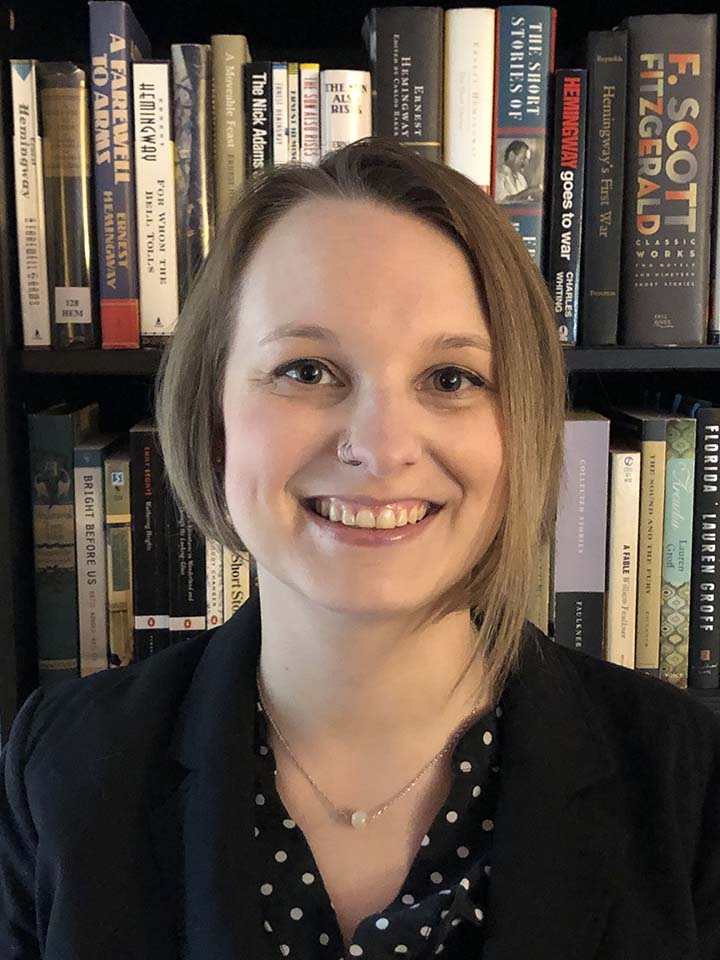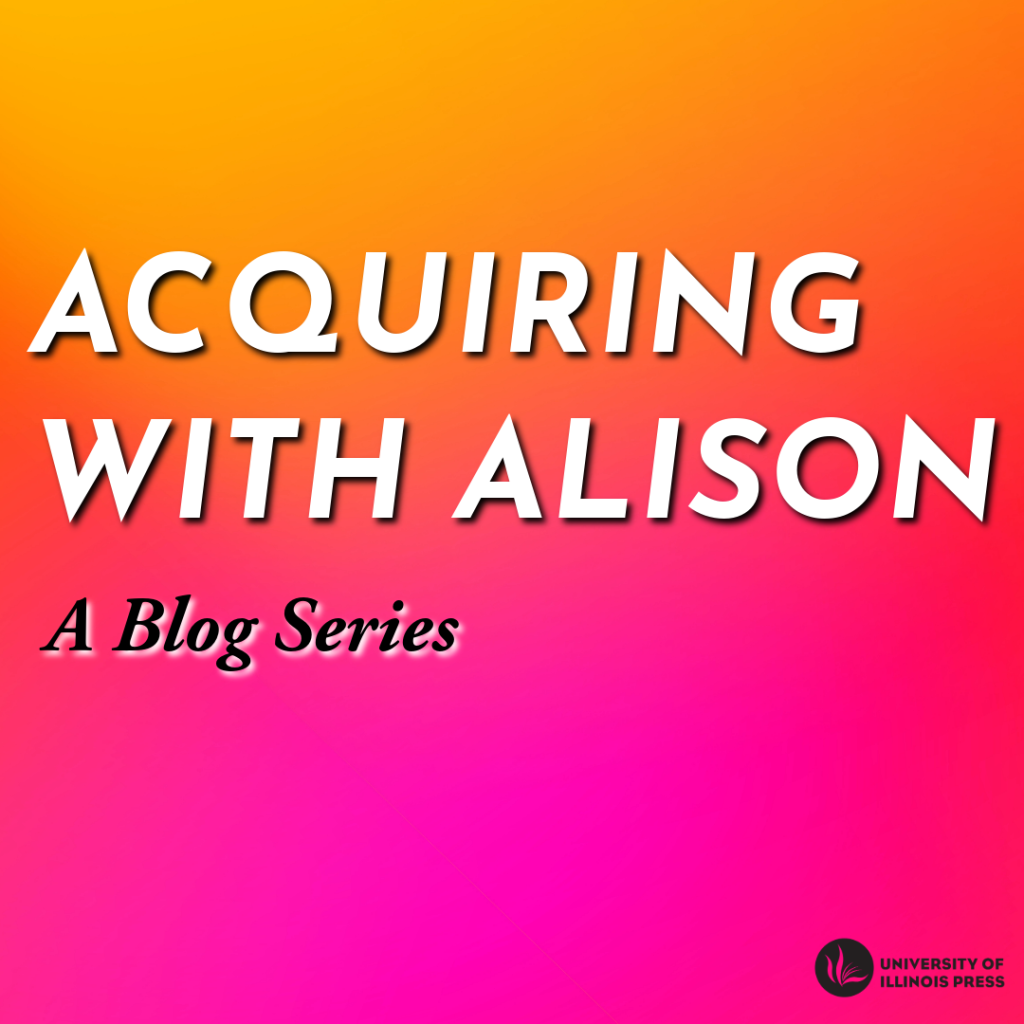This is the number one question I am asked whenever I give talks. Like many questions I will answer here, the answer depends a lot on the author, the project, and the editor. However, I will lay out some strategies that may be useful to authors looking for an editor.
Finding a press and an editor
The first step in contacting an editor is identifying presses that publish in your field. To do this, look for the best books in your area by topic and/or methodology. Which books have an approach that mirrors your own? Which books have won awards? Which books have marketing campaigns or covers that speak to you? Which books appear in series that cover your topic area? You will be familiar with some of these books simply by their applicability to your own work, but you can find others by subscribing to press newsletters or catalogs, visiting presses’ websites, or perusing the exhibit hall at conferences.
Once you have a good list, narrow down the books by publishing date. Pay attention to books published in the last five years, or even the last year or two, if possible. These will give you the best indication of books that presses and editors are actively working on.
At this point, authors should have a short list of presses. I would aim for no more than five at this stage. To find the editor who works on these titles, visit the presses’ websites. If it isn’t clear who the best editor for your project might be, you could reach out to the editorial director or editor-in-chief, who should be able to connect you. Similarly, you could approach press staff at a conference to ask about the editor for your area. I would avoid blanket emailing the entire acquisitions department.
Reaching out to an editor
If you have a connection to an editor or press through a colleague or mentor, do leverage it. I learn about a number of my authors from connections I’ve built with other scholars, and it is a helpful way for me to know that this new scholar’s work is interesting to a wider community. And honestly, it might get you a response more quickly.
If you don’t have a connection to an editor, I recommend starting with a query email. Share a brief abstract of your project and ask if this is something the editor is interested in. If you have a proposal, you could include it, or you could save it as something to follow up with if the editor is interested. This is also a great way to interact with editors at a conference. Either request a meeting in advance or stop by the booth with a summary of your project in mind. If they are interested, then you can follow up after the conference with the formal proposal. I don’t recommend emailing full manuscripts to editors unless they ask.
Once a new author emails me and I express interest in their work, I often like to schedule a Zoom chat. This is a great way to get to know the author and their work, and to set expectations for the next steps. I work with many kinds of authors, from early career scholars to those who have written multiple books, as well as independent scholars and authors writing for general audiences. Early career scholars may not know what questions to ask; experienced scholars might know the publishing process, but the details might be different if they’ve worked with different presses. At this chat, we can set the tone for our relationship and talk through my specific process and the process at the press as whole. We can also discuss decisions, like whether to send a proposal out for review or wait for the full manuscript. If your editor doesn’t suggest a meeting, you can always ask.
Whether you meet with an editor face-to-face or correspond via email, I would definitely recommend asking them questions about aspects of the acquisitions process like peer review and contracting. If you have specific concerns or priorities, these are great to bring up at the initial meeting, too. For example, you might want to make sure your book goes to specific conferences, or you might want to know if the press has open access options. It is helpful to ask these questions early, because the answers may help you narrow down the press and editor you ultimately want to work with. It will also help the editor to know these details early, especially if they need to coordinate with other colleagues.
When you reach out to editors, I recommend allowing at least a month until you plan on hearing back, though this timeline can vary among editors. I try to evaluate new work once a week, but sometimes other commitments intervene. If an editor takes a few weeks to respond, this isn’t an indication that they aren’t interested in your work; rather, it’s more likely an indication of their workload. If you have heard from other editors and are still interested in working with someone you haven’t heard from, you might send a follow up to this effect.
Follow-up questions
Scholars often ask me if they need a proposal to approach an editor. I don’t require it. I often speak with early career scholars who have finished their dissertations but don’t yet have proposals. Likewise, I might speak with more senior scholars who are thinking about future projects but don’t have a firm plan in place, or they might be deciding which project to tackle first. I welcome these conversations, because I can sometimes give the scholars advice on how to craft the proposal or what project might be the best fit for my lists. However, other editors might prefer to start conversations with a proposal. None of these approaches are wrong; they likely reflect how the editor works best or even the norms at their press. I plan to discuss book proposals more in depth in a future post.
Relatedly, I sometimes hear from scholars that they are worried about approaching an editor they spoke to years ago, because it took so long for them to finish their project. It is not only okay to approach the editor again, it is totally normal! I understand that scholars have other professional commitments—and lives!—that may intervene, and I prefer scholars to come back to me when they are ready, even if it has been years since we spoke. That said, don’t expect editors to remember everything about previous conversations. They have likely had hundreds since then, and they don’t know which ones will amount to submissions. Personally, I also don’t usually take notes while I meet with people, because I want to be fully present in the conversation. (I usually jot down a few notes after we meet, but these may or may not make sense years later!) It is helpful for me when a scholar briefly reintroduces themselves and their work if we haven’t spoken in a few years.
What happens once an author and editor decide to work together? Typically, the first formal step will be peer review. I plan to cover peer review, and many other topics, in future posts.

Alison Syring is an acquisitions editor at the University of Illinois Press. She has degrees in English literature and history from the University of Maryland, an MA in writing from Johns Hopkins University, and an MFA in creative writing from the University of Illinois. She started in publishing as a production editor and worked for several years as a technical writer. Alison began as a Round the Press intern through the graduate English department, after which she was hired as a full-time assistant editor. She has been acquiring in history and religion since 2020. Alison continues to acquire and grow a flagship series—the Working Class in American History series; diversify our Mormon studies list and broaden into religious studies; and maintain our commitment to early-career scholars by starting an Outstanding Dissertation in Disability History prize published through our Disability Histories series.

